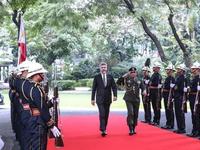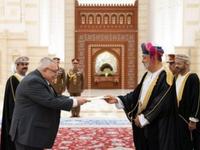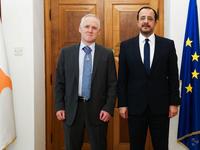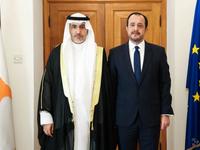Press Releases
17-07-2018 12:28
The Foreign Minister, Mr Nikos Christodoulides, on Cyprus’ geopolitical role in the Eastern Mediterranean at the AJC Transatlantic Institute, Brussels
The Geopolitical Role of Cyprus in the Eastern Mediterranean: Regional Stability, Energy Security and Counterterrorism
Allow me to begin by expressing my sincere appreciation to the American Jewish Committee (AJC) Transatlantic Institute, and to its Director, dear friend Daniel, for the opportunity provided to engage with such a distinguished audience on Cyprus’s geopolitical role in the Eastern Mediterranean, and how it is utilized to implement some of the core pillars of Cypriot Foreign Policy: promoting regional stability, energy security and counterterrorism.
At the outset I would like to express my warmest thanks to the leadership of the American Jewish Committee - with whom I have had the great pleasure to work closely with over the last blossoming years of our interaction, in my role as Government Spokesperson and Director of the Diplomatic Office of President Anastasiades – for their strong, sincere and results-oriented interest in Cyprus. Your own collaboration with the Permanent Representation of Cyprus to the EU to organize today’s event, stems from this keen interest the AJC has shown and testifies to a deeply rooted friendship.
Dear friends,
The core premise of today’s presentation is the geostrategic role of Cyprus in our immediate neighbourhood, the Eastern Mediterranean. So my first attempt will be to deconstruct the various layers that render the geostrategic role of Cyprus important and valuable in this corner of the world.
The starting point in answering the question of why is Cyprus’s geostrategic role important, and our comparative advantage, is geography.
One of the most capturing narratives on Cyprus’s geography is the one provided by US Ambassador Thomas Boyatt, in a presentation at the Foreign Service Institute in Washington DC. It goes like this:
“Cyprus, is an island in the northeast corner of the Mediterranean. It sits there like an aircraft carrier and dominates between east and west, as well as between north and south. Every empire from the Egyptians to the British, which has sought to dominate the Middle East, has had to control Cyprus.”
It is this unique geographical position of Cyprus, at the south-eastern-most corner of the European Union, at the cross roads of Europe, Asia, the Middle East and Africa, that has to a very large extent defined the history of Cyprus. And while more often than not our geography has been more of a curse than a blessing, our determined efforts in the last few years have been to reverse this narrative, and turn our geographical position into a blessing, putting it at the forefront of our geostrategic value.
Another important component when dissecting Cyprus’s geostrategic role is one also related to geography: the region in which Cyprus belongs to. The Eastern Mediterranean, a turbulent, full of challenges but also opportunities corner of the world. The Eastern Mediterranean is important for the European Union and the international community for a number of reasons, one of the most important being that addressing the challenges in this region, holds the key to addressing many of the root causes of the challenges the EU and the international community faces.
Cyprus’s status as an EU member state as well as its excellent, long-standing relations with its neighbours are also vital in understanding the importance of Cyprus’s geostrategic role. The combination of these factors renders Cyprus a natural bridge that can be catalytic in constructing a positive agenda between the EU and the region. This positive agenda is indispensable in addressing the many challenges our region and the EU are called to address.
Of these challenges I will focus on three that also form some of the core pillars of Cyprus’s foreign policy: promoting regional stability, energy security, and counter-terrorism.
Let us tackle the regional stability pillar, a necessary prerequisite to any form of prosperous development of the region, and in many ways the key to effectively addressing many of the challenges the Union and the international community have to resolve. For example, at Foreign Affairs Councils agendas issues such as migration have featured prominently in the last years and have at times threatened the unity and cohesion of the Union. Where do the root causes of the humanitarian migration crisis the EU stem from? We cannot answer this question unless we also turn our attention to the Eastern Mediterranean.
Recognising the importance of regional stability, Cyprus has worked with Greece and others in the region, such as Israel, Egypt, Jordan, Lebanon and the Palestinians in creating trilateral cooperation mechanisms. I have been fortunate to witness firsthand the genesis and evolution of the trilaterals since the first Summit with Egypt in Cairo in 2014, to the most recent, in May, with Israel in Nicosia. It was within this context that my first bilateral visits upon assuming duties in March 2018 as Foreign Minister were to the countries of the immediate region: Israel, Jordan, Lebanon, Egypt, followed by Saudi Arabia and most recently the United Arab Emirates.
The trilateral mechanisms, which the AJC has consistently supported, are arguably one of the most successful additions to Cyprus’s foreign policy footprint, and a manifestation of our strategy to create synergies and forge closer cooperation with moderate countries of the region. To date, we have had five Summits with Egypt, four with Israel, the inaugural Summit with Jordan in Nicosia in January, and preparations are underway for Summits with Lebanon and Palestine. Trilaterals have taken place also at the level of Foreign Ministers, as well as other Ministers, and are often followed by meetings aimed at implementing joint decisions taken at Summits.
This innovative trilateral mechanism is now common place, and the meetings are taking place at regular intervals, creating and facilitating synergies in a broad range of areas: from economic cooperation to culture and education. As you may be aware, most recently Prime Minister Netanyahu, and Prime Minister Tsipras joined President Anastasiades in Nicosia in May for a trilateral meeting. Currently, preparations are under way for a trilateral between Cyprus, Greece and Egypt in Crete, and in December with Israel at Beersheba, Israel’s Silicon Valley.
The central tenets of the trilateral cooperation is that they are neither exclusionary nor exclusive, nor are they directed against any third country, but are an instrument for promoting cooperation. Here too it is important to understand that by their very nature, there is no “one size fits all” framework, but are molded and evolve in areas where there is a comparative advantage, including broadening the trilateral format to bringing in additional partners in specific fields. For example, Cyprus, Greece and Israel, have expanded their talks to include Italy and the European Commission in our discussions of cooperation on energy related issues.
The benefits from these regional developments bear fruits not only for the countries in the region, but also for the European Union. The Union must seize the moment and reap these benefits. As I have mentioned recent crises that have emerged for the Union – such as migration – go back to these region, and solutions can only stem if the Union not only looks inwards but also outwards. The Eastern Mediterranean is the Union’s neighbourhood, and a vital one at that.
Let us now turn to energy security, also featuring high on the EU agenda, and where the Eastern Mediterranean potentially holds a vital part of the solution.
Dear friends,
Ladies and gentlemen,
The discovery of hydrocarbons in the Eastern Mediterranean, which is also one of the core pillars of the trilateral cooperation mechanisms, has opened new horizons in our bilateral relations with Israel, Egypt and other countries in the region, but also for the European Union.
Much has been said and written on the energy potential of the Eastern Mediterranean. In fact, according to the USA Geological Survey assessments the Eastern Mediterranean region (the Nile Delta Basin and the Levantine Basin) holds enormous quantities of natural gas and oil. Essentially, discoveries of hydrocarbons in the Eastern Mediterranean hold the potential of providing for our countries sufficient and stable energy supplies in natural gas at affordable prices, and to contribute towards the transformation of the Eastern Mediterranean into an area of sustainable and balance economic development.
Perhaps the most important step was undertaken with the conclusion of three Agreements - with Egypt, Israel and Lebanon - delimiting our respective Exclusive Economic Zones, in line with the 1982 UN Convention on the Law of the Sea.
The delimitation of our Exclusive Economic Zones, by agreement, created a new regional dynamic. First, it created greater transparency based on international law. Second, it created a new economic border structure. And third, and perhaps most importantly, it set up a new framework for dialogue around a concrete shared goal. This new diplomatic framework was the natural stepping stone to the trilateral cooperation mechanisms.
At the same time, this framework, created the necessary legal and institutional structure, at the national and international levels, which could attract major oil and gas companies to invest and do business within Cyprus’ Exclusive Economic Zone. And it has clearly worked. Major international oil and gas companies such as EXXONMOBIL, ENI, TOTAL, NOBLE, SHELL, to name a few, have signed Production Sharing Contracts with the Government of the Republic of Cyprus, are present in Cyprus’ EEZ and carry out exploratory drillings and development activities. Their presence and operations in Cyprus’ maritime zones are a vote of confidence both to the prospects of new hydrocarbon discoveries and to the Government of the Republic of Cyprus itself.
We are also close to concluding agreements for the export of natural gas from the Aphrodite reservoir in Cyprus EEZ to Egypt and the LNG plants there, as well as to concluding a Cyprus - Egypt Intergovernmental Agreement for a direct underwater pipeline that would carry Aphrodite’s natural gas to Egypt.
Cyprus has adopted the view that hydrocarbons can become the new coal and steel, in a new regional context. A tool of cooperation and synergies that would create an economy of scale, an inviting environment for companies and investors; a tool that would meet the energy security needs of the region and that of the EU and gradually contribute to greater stability in relations among countries of the region and promote security and peace. And ultimately, why not, a catalyst for greater, more institutionalized political co-operation in the region.
Eastern Mediterranean hydrocarbons are also expected to contribute to the implementation of the European Union’s policy of diversification of sources and routes. Towards this end, we are actively working on a project of European interest: the East Med Pipeline Project. This is a project adopted as a Project of Common Interest by the European Commission that has financed its feasibility studies. It provides for the transfer of natural gas, by an underwater pipeline, from Israel and Cyprus to Greece, via Crete, and from Greece to Italy. The aim is to have an Agreement signed by these four partners by the end of the year.
Ladies and gentlemen,
Dear friends,
I would like now to turn to the third challenge I identified at the beginning of this presentation - terrorism - the efforts that are being undertaken to counter it and Cyprus’s role in these efforts, including through the trilateral cooperation mechanisms which from their birth included counter-terrorism cooperation as one of their priorities.
For Cyprus countering terrorism is a collaborative effort. It is not enough to secure one’s country and borders, but close cooperation with reliable and like-minded partners is necessary. To this end we are in close dialogue and collaboration with our regional neighbors, all recognizing that the nature of 21st century terrorism is international and fluid.
Cyprus is participating in a number of international efforts, including the Coalition Against the Islamic State, and the Aqaba Process. We have actively, and in cooperation with some of our European allies, provided military assistance, and also provided non-military support to the EU efforts in the Sahel.
We are also working closely with other, non-European partners, mainly with the United States. We cooperate with the US in providing specialized training assistance to officials from neighboring countries, and collaborate closely also with Egypt. The training revolves mostly on civilian type of expertise, be it customs or border controls, being able to identify and contain various chemicals, better storage and handling, etc. These are considered to be hugely important in the focus that is being directed against the transfer of illegal and usually non-conventional substances that could be used to create havoc.
In our discussions with our partners in the Gulf, we have explored collaboration efforts to counter violent extremism, and radicalization, trying to catch the problem at its root. This is a long and difficult process, especially as we have witnessed that incitement has moved to the Social Media, and there we are caught between our wish to be free and open societies, and the need to secure and protect our citizens.
At this time I also want to add that we are observing with deep concern the rise of anti-Semitic attacks and rhetoric, which is deplorable, as are other expressions of intolerance, hatred and violence against the other. During recent years we have invested a great deal on education and the exposure of our communities to the historical roots of anti-Semitism and racism. We believe this is an invaluable investment – not only because it is the right thing to do – but because it is the best, proven way to prevent radicalization and violence. I assure you that Cyprus will remain at the forefront of these efforts.
Ladies and gentlemen,
I could not conclude this presentation, which has touched on the incredible challenges but also potential of the Eastern Mediterranean, without referring to the Cyprus problem, and the impact its solution would have on the region.
I would like to reiterate in the strongest terms our commitment of working for the reunification of Cyprus and its people after 44 years of division and Turkish military occupation, through a comprehensive settlement of the Cyprus problem, in line with international and EU law.
A viable solution to the Cyprus problem, which would safeguard the country’s independence, sovereignty and territorial integrity would not only amplify Cyprus’s bridging capacity, but would also mark a paradigm shift in bringing about peace and stability in the region. This would certainly serve the interests of our key partners, of the EU, and certainly of the region. It goes without saying that for the good of regional stability Cyprus needs to remain a truly independent state, without third party interference, so as to continue to function as a reliable partner in the region.
A breakthrough in the Middle East Peace Process, through a credible and balanced framework for a fair and viable solution, would also serve in unleashing the region’s incredible potential.
Esteemed guests,
Ladies and gentlemen,
For the many complex challenges the region, the EU and indeed the world faces, we are convinced that the answer is for all states to look outwards, not inwards; to address challenges decisively, collectively, through enhanced cooperation, and by fostering more synergies. Cyprus is determined to continue utilizing its geostrategic location in this direction.
Moderate countries in the Eastern Mediterranean in particular have an obligation to strengthen their ties, because the stronger our bonds are, the stronger we all are in building a more prosperous, peaceful future. Cyprus, Israel, Egypt, together with other countries in the region who share this vision, with the EU’s support and involvement, can become hubs of cooperation amidst multiple layers of instability and volatility; this would be to the benefit of our countries, the region but also for the EU who must enhance its presence in the region.
I am convinced that the trilateral mechanisms are a first promising step to what can develop, when conditions are ripe, into a regional, institutionalized cooperation mechanism, and a regional dialogue serving the common goals of strengthening relations, promoting solidarity and mutual understanding between Europe and countries of the Middle East and wider region. This can start with “softer” policy areas such as protection of cultural heritage, environment, technology and innovation – and can eventually offer a “New Deal” for the Eastern Mediterranean, and inaugurate an era of increased, mutually beneficial collaboration.
Thank you for your attention, I look forward to our discussion.
(MF/MG/SCH)
Relevant Press Releases









